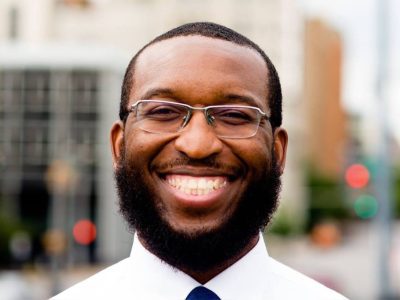
Dr. Peniel E. Joseph is Professor of History at Tufts University and the author of the acclaimed Waiting ‘Til the Midnight Hour: A Narrative History of Black Power in America and Dark Days, Bright Nights: From Black Power to Barack Obama. Dr. Joseph is a scholar of what he calls “Black Power Studies,” and aims to take a different look at the post-World War II/Civil Rights era–one that emphasizes the grassroots elements of the movement and the need for aggressive solidarity amongst black people. Dr. Joseph recently explained how his mother shaped his view of what it means to be an intellectual and activist.
“People always ask me ‘Why do you have that strange name?'” he explains. “I’m the proud son of Haitian immigrants who came to the United States in 1965. My first public intellectual was my mother Germaine Joseph, who remains my hero. She worked for thirty years at Mt. Sinai Hospital as a worker, part of the SCIU 1199 union. I was on my first picket line when I was in elementary school.”
“My mother told me and my older brother what the Haitian revolution meant, not just to black America, but to the entire world. How a colony of slaves became a republic of citizens in 1804. She argued that even though we were from the Caribbean, we were also black Americans. And even though we were black Americans, my mom told us we were also Africans. Just like Kwame Ture always told us.”
“So my idea of a public intellectual is one who is an activist,” Joseph continued. “Historically, Sojourner Truth was a public intellectual. Ida B. Wells, who told the nation that lynching was not only a horror, but it was a constitutive element of white supremacy and had to be eliminated, had no Ph.D, was a public intellectual.”
Dr. Joseph champions people like Stokley Carmichael/Kwame Ture, as well as the under-appreciated Civil Rights activist Fannie Lou Hamer, who helped organize the Mississippi Freedom Summer for the Student Nonviolent Coordinating Committee (SNCC) and later became the Vice-Chair of the Mississippi Freedom Democratic Party.
“Stokely Carmichael/Kwame Ture lived and worked among poor, black sharecroppers in Alabama and Mississippi,” he shares. “When he was in Chicago in 1965 being interviewed by Studs Turkle, they asked him who was his hero–was it Martin Luther King, Jr? He said ‘No, it’s Fannie Lou Hamer.'”
“It’s not about Ph.D’s from Harvard and Princeton and it’s not about the person who is on national television,” Joseph stated. “It’s about who is engaged with grassroots, poor people and speaking truth to power–even if it means you’re not getting invitations.”
Joseph took to task those who engage in the public discourse but fail to address issues that are at the core of the black struggle in America.
“Who is talking about white supremacy? Who is talking about sexism and misogyny?” he asked. “Who is talking about rampant unemployment in our communities, mass incarceration, and the fact that even with a black president, the 54 percent of wealth that African Americans lost in the great recession–it hasn’t been gotten back.”
“The onus is on us to make it plain, like Malcolm X articulated,” Joseph added. “We speak to people in plain language, but even more importantly, we make sure our history is a living document. We make sure that names like Kwame Ture get echoed into the 21st century. We need to be engaged with those who are marginalized, on the fringes of society. Education is not the litmus test for being a public intellectual.”












